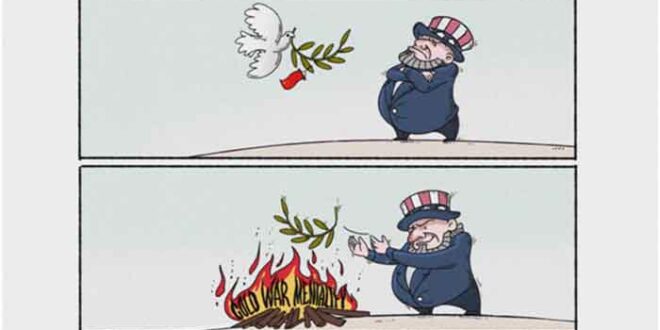Rational foreign policy for any country can be defined as policy based on advancing the short-term as well as the long-term interests of that country and reconciling this with the most essential concerns of the world for peace and protecting the life-nurturing conditions of planet.
There can be wide consensus on such a non-controversial presentation of rational foreign policy. The two parts are actually supportive as without world-level peace and accompanying protection of essential life-nurturing conditions of planet there can be no rational pursuit of narrowly perceived self-interests. This is particularly true of the most powerful country of the world the USA whose foreign policy has an overwhelming impact on the well-being of the entire world, more than the foreign policy of any other single country.
Unfortunately it is precisely this country, whose enlightened foreign policy can be the most beneficial for the entire world, which has fallen into the morass of a foreign policy based on an extremely narrow and aggressive worldview.
This aggressive policy has brought immense distress to a very large number of people ad what is more, has made the future appear even more dangerous and uncertain. Understandably, there has been much criticism of this, from a world perspective as well as domestic perspective, by several persons of eminence and expertise in these matters but despite these the US political establishment has been able to create a near consensus within itself on some of the most harmful aspects of these policies, so that the harmful policies have survived several changes in government.
The USA is a country very richly endowed with resources. It came out of the Second World War to find conditions in which several historical circumstances had combined to give it a very favorable place and a leadership role in world, including a great privilege of its currency being the predominant reserve and exchange currency. The world opinion on the USA was highly favorable.
From this history-given highly favored position the USA only had to maintain its cool and follow policies of peace and diplomacy-led resolving of differences to go further from strength to strength. Instead the USA took upon itself the role of promoting and favoring capitalism based on big multinational companies and military industrial complex at world level and in the process over-reached a single country’s capacity time and again, getting entangled in long-drawn conflicts and invasions which were much easier to start than to pursue and end in any purposeful way. In the process it lost the goodwill of a great many people and instead time and again became the object of hatred of people whose lives had been destroyed by its numerous military interventions.
Just compare the goodwill the USA had after the Second World War with its reputation today, and you have to ask what were all the wars and all the bloodshed about, what were these meant to achieve and what has been their actual impact?
The fig leaf was that the USA had to save the world from communism and communism’s leading center the USSR, but even for a moment accepting this, when communism collapsed in the USSR and when the USSR itself disintegrated, even then the wars and proxy wars of the USA went on unabated.
While these wars wasted trillions of dollars in destroying several countries, within the USA poverty, denial of basic needs, homelessness, indebtedness, crime and violence, physical and mental health ailments, infrastructure collapse, environmental ruin and other serious problems increased, with frequent complaints of under-budgeting of priority domestic welfare objectives.
The USA led the NATO and made it an important basis for assuring security to a select number of allies. However people in an increasing number of allied countries are unhappy about the risks and compulsions that come their way as subservient allies of the USA.
These long-persisting problems are peaking with USA perceptions about its supremacy being threatened by China or others. Its response has been to opt for even more aggressive policies against those who may be able or willing to challenge its supremacy, singly or in alliance with others. The proxy war against Russia and the much-discussed future proxy or direct war against China may be seen in this wider context.
This with its possibility of direct confrontation of biggest military powers and nuclear weapon powers brings the irrationality of US foreign policy into sharper focus as any policies which increase such destructive possibilities cannot be good for the country and cannot be good for the world. Even the closest allies may become increasingly unhappy as the dangers of USA’s most aggressive policies come nearer, and very few may actually join any invasion or full-fledged war against China.
Hence while the irrationality of US foreign policy is clear enough, this irrationally appears nevertheless to be embraced by the overwhelming majority of the political class in both the main political parties. Those who oppose this in the political establishment, or in the academia or the media, are marginalized all too soon. Hence the USA is denying itself a very big strength of democracy, that of corrective action being taken at an early stage by open and fair debates in which dissenting opinion has a good chance of being heard adequately and reaching an adequate number of people. Several eminent persons, including academics and journalists, have expressed their frustration and distress regarding this. One hopes for the sake of peace that those advocating a change in US foreign policy within this country can become stronger and more numerous in the near future.
 Eurasia Press & News
Eurasia Press & News



